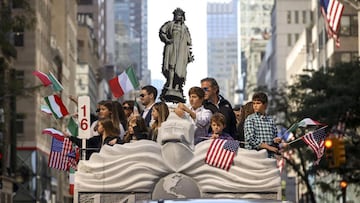Columbus Day in USA: meaning, origin and why it is celebrated today?
The commemoration of Christopher Columbus’s voyage has evolved into a contentious occasion with increasing numbers of people disagreeing with the premise.

On 12 October, 1492, Christopher Columbus and crew members of his flagship La Santa María waded ashore on San Salvador Island in the Bahamas. For Columbus, a Genoese seafarer and navigator, it was a case of being in the wrong place at the right time.
Although the 41-year-old had correctly surmised the world was spherical and not flat, as a majority of scholars of the time insisted, he did not anticipate colliding with the Americas en route to the Far East. He did, though, change the course of history.
Sailing under the royal standards and with the patrimony of the Catholic Monarchs Queen Isabella of Castile and King Ferdinand II of Aragón, Columbus set sail from Palos de la Frontera in Huelva, Spain and stopped at the Canary Islands before setting out into the vast expanse of the Atlantic from San Sebastián de La Gomera. Some five weeks later, the Italian adventurer would secure his place in history as he made arguably the most impactful step for humankind until Neil Armstrong set foot on the moon nearly five centuries later.
Columbus Day in the United States
Columbus Day was first celebrated in the US in 1792 according to records, when the Tammany Society in New York and the Massachusetts Historical Society marked the 300th anniversary of Columbus’ landing in the Americas. New York-based Italian-Americans held celebrations on 12 October, 1866, but it was not until 1937 that it became a federal holiday. Originally observed on 12 October, in 1971 Columbus Day was assigned to the second Monday of October.
However, while the Italian-American community’s adherence to Columbus Day remains strong, it has been widely shunned across the US following a groundswell of public commemoration indigenous history. Many states and cities do not recognise Columbus Day and have replaced celebrations recording the discovery of the Americas with Indigenous People’s Day festivities instead.
Columbus Day around the world
In Latin America Columbus Day was variously marked as Día de la Raza (Day of the Race) though several countries have begun to embrace other approaches. Argentina for example celebrates a “Day of Respect of Cultural Diversity” while Peru marks “Indigenous Peoples and Intercultural Dialogue Day.” Venezuela changed the name of its celebrations in 2002 from Día de la Raza to “Day of Indigenous Resistance” while Colombia, named after the polarizing figure, celebrates “Day of the Race and Hispanicity”
Spain, whose purse strings funded Columbus’ expeditions, celebrates its National Day on 12 October with a military parade in Madrid but but it is not widely marked across the country. In recent years, Latin American residents in Spain have brought the colour and music of their own celebrations to the Spanish capital.
Columbus Day has been officially celebrated as a holiday every year in Italy since 2004.
Columbus Day controversy
Columbus’ landfall in 1492 resonates to this day. The conduct of the discoverers of the New World makes it a difficult day to celebrate. The introduction of rampant diseases to which indigenous peoples had no natural defences can be put down to the medical ignorance prevalent at the time, but it is harder to excuse Columbus, and those that followed him across the Atlantic, for laying the foundations of a brutal slave trade that spanned almost three centuries.
The 21st century witnessed major backlashes against the idea of celebrating Columbus’ expeditions with statues of the explorer being torn down and replaced across Latin America and more and more US cities are declining to mark the occasion in any way.





